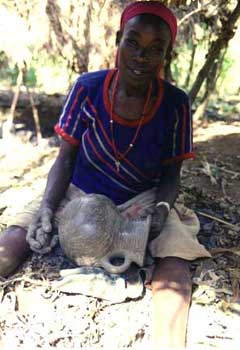
This is the fourth year that I have been visiting a pottery-making
village in the Ari, southwestern Ethiopia. In the village, only the women in
a special artisan group make pottery and they mainly make their livelihood
for their household.
Dey (a pottery maker) usually goes straight to the pottery-making
hut after breakfast is over, but on that day she didn’t get to work.
When I was wondering what happened to her, she told me that her husband, Natsua,
seemed to have hidden her polishing stone, which was called zukusa in Ari language.
She asked me to tell her husband where her zukusa is.
The zukusa is used for polishing pots after making the form.
Some are milk white or ebony in color and others look like crystal. When the
surface of the pots is polished with the zukusa, the pot after firing takes
on a pearly luster. Before young makers are going to get married, they try
to get their own zukusa. Some makers found it in a river, and others received
it from a mother or a grandmother. They sometimes try to buy better one from
people who live in zukusa fields.
For pottery makers, it seems that the zukusa is the precious
tools for making their pots. They always take their zukusa wherever they go;
even they visit their neighbors and relatives. When husband cannot find his
wife’s zukusa in his house, he sometimes starts to complain to her because
he suspects her of planning to leave his home. He might also hide the zukusa
if he thinks that his wife looks as though she intends to leave.
Dey’s zukusa was found beneath their bed in the evening
on that day. I had absolutely no idea whether Natsua had hidden it or whether
Dey had simply forgotten where she had put it. When I asked her why the stone
had been missing, Dey just said that Natsua was impatient.
Some days afterwards, Dey suddenly left his home with her zukusa.
As soon as Natsua noticed it, he was following her to take her back his home.
Well, I will write their following story again.
|
 Postcards from the Field
Postcards from the Field